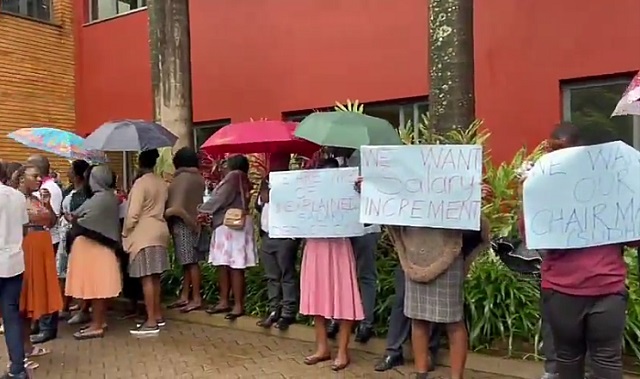
Kampala, Uganda | THE INDEPENDENT | A teachers’ protest at Kampala Parents School has brought renewed attention to the poor working conditions faced by educators in Uganda’s private schools.
In a viral video, teachers held placards as they voiced concerns over delayed salaries, low pay, and favouritism toward Indian staff over other employees, allegations that have shocked many given the school’s reputation as one of Uganda’s most prestigious institutions.
Despite parents paying high fees, the teachers’ grievances reveal stark disparities between expectations and reality. Many assumed such a prestigious school would offer its staff exceptional remuneration and favourable working conditions.
“This isn’t what we expected from a school of this stature,” said one teacher in the widely shared video, describing salary delays as “humiliating” and favouritism as “demoralizing.”
The school, owned by prominent businessman Sudhir Ruparelia, has downplayed the teachers’ concerns, describing the situation as a “minor issue.” In a telephone interview with our reporter, the school’s principal, Daphne Katos, dismissed the matter, stating, “We are here, we are moving on. Teachers are in classes, teaching. Yes, that is what you can say.”
When pressed further about the striking teachers’ grievances, Kato declined to comment further, insisting she had already said enough.
The protest has ignited widespread debate on social media, with many Ugandans calling for government intervention to regulate working conditions in private schools. The strike also highlights broader challenges in the education sector, as teachers across the country share similar experiences.
Blaise Mukama, a teacher at another private school in Kampala, described the systemic exploitation in the sector.
“Teachers are treated almost like children,” he said. “We work from 4 a.m. to 10 p.m., with no breaks, no NSSF contributions, and often months without pay. The school owners charge high fees but neglect our welfare. We have families depending on us, and this neglect is devastating.”
Mukama’s comments underscored the broader challenges in Uganda’s private school system, where teachers often lack formal protections, job security, and basic benefits despite the rising costs of education for parents.
Juma Mwamula, Secretary General of Uganda Private Teachers’ Union, called the situation at Kampala Parents School a wake-up call for the education sector, saying it reflects the broader challenges faced by private school teachers across Uganda.
“If a leading school treats its teachers this way, imagine the conditions in smaller, less-resourced schools,” Mwamula said. He highlighted the poor welfare of teachers in the private sector, noting that many school owners view teachers as cost liabilities, striving to minimize their pay to maximize profits.
Mwamula further pointed out that the lack of a national minimum wage exacerbates the problem, leaving teachers in a weak position when negotiating for better pay and working conditions.
The union leader, however, stressed the importance of unity among teachers, describing it as a critical step toward achieving meaningful collective bargaining. “One remedy is the unity of teachers,” he said. “That in itself gives us legal authority to push for better conditions.”
He also highlighted international frameworks like the Decent Work Agenda, which outlines basic standards for workers’ rights, as essential tools to improve teachers’ welfare.
Mwamula expressed frustration over the Ministry of Education’s continued disregard for the plight of private school teachers despite numerous appeals for intervention. He criticized the National Teacher’s Bill for focusing on issues such as licensing and requiring degrees as minimum qualifications while neglecting key concerns like salaries and job security.
“It says nothing about a minimum wage for teachers or provisions for job security,” he noted.
While advocating for better pay and welfare, Mwamula also encouraged teachers to diversify their income sources to reduce financial vulnerability.
Hasadu Kirabira, the chairperson of the National Private Educational Institutions Association (NPEIA) of Uganda acknowledged that challenges persist in the private education sector regarding teachers’ welfare. While he admitted that some schools still use “rudimentary approaches” in managing staff, he emphasized that there are mechanisms for handling grievances, including engagement with education and labour officers.
However, Kirabira highlighted a recurring issue where teachers, in some instances, compare their salaries to the school fees collected, often overlooking the broader financial demands of running a school.
“Sometimes, a teacher focuses solely on their earnings without considering expenses such as feeding, rent, health care, and other operational costs,” he explained.
He emphasized the need for clear agreements between employers and teachers regarding workload and remuneration, stressing the importance of mutual understanding. “If someone feels overburdened or dissatisfied, they should seek resolution through the appropriate authorities or explore other opportunities. Schools are not prisons,” he added.
The issue has surfaced at a time when private school owners and teachers are set to meet with Education Minister Janet Kataaha Museveni to discuss challenges facing private schools, including teacher welfare and policy harmonization. The meeting is scheduled for December 3.
*****
URT
 The Independent Uganda: You get the Truth we Pay the Price
The Independent Uganda: You get the Truth we Pay the Price






